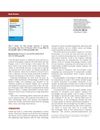 August 2017 in “Journal of The American Academy of Dermatology”
August 2017 in “Journal of The American Academy of Dermatology” The book is a detailed and well-organized resource on skin conditions, useful for medical students and dermatologists.
 January 2015 in “Aesthetic Surgery Journal”
January 2015 in “Aesthetic Surgery Journal” The book is a valuable resource for learning about new cosmetic dermatology treatments, despite some content overlap and inconsistent visuals.
 February 2024 in “Asian journal of medical sciences”
February 2024 in “Asian journal of medical sciences” Proper hygiene, adequate sleep, and self-care can reduce common skin diseases.
 March 2024 in “Sudan Journal of Medical Sciences”
March 2024 in “Sudan Journal of Medical Sciences” Many doctors lack knowledge about COVID-19 skin symptoms and need better education and guidelines.
 54 citations,
September 2005 in “Australasian Journal of Dermatology”
54 citations,
September 2005 in “Australasian Journal of Dermatology” Dermatologists are more accurate than general practitioners in diagnosing skin conditions, especially skin cancer.
 14 citations,
April 2017 in “American Journal of Transplantation”
14 citations,
April 2017 in “American Journal of Transplantation” Skin problems from transplant drugs are common and need careful management in organ transplant patients.
 9 citations,
September 2015 in “Medical Clinics of North America”
9 citations,
September 2015 in “Medical Clinics of North America” The document explains how to do skin procedures, care after surgery, and when to use certain treatments.
 9 citations,
April 1987 in “International Journal of Dermatology”
9 citations,
April 1987 in “International Journal of Dermatology” Stopping the depression medication improved the woman's eyebrow hair loss, and a treatment for a skin condition caused by mites was effective.
 July 2003 in “Journal of Cutaneous Medicine and Surgery”
July 2003 in “Journal of Cutaneous Medicine and Surgery” Skin problems are common in Bangladesh due to arsenic, prompt treatment of diabetic foot ulcers is crucial, maternal transmission causes most neonatal herpes, treatments for pediatric vasculitis are effective, the chickenpox vaccine works, more frequent UVB therapy helps psoriasis, certain jobs increase hand dermatitis risk, monoclonal antibodies treat psoriasis well, lifestyle affects psoriasis, alefacept improves psoriasis, imiquimod cream partially clears basal cell carcinoma, and iron may not help chronic hair loss.
 1 citations,
June 2010 in “Expert Review of Dermatology”
1 citations,
June 2010 in “Expert Review of Dermatology” Covers common skin issues in kids, their diagnosis, treatment, and need for specialist care.
 January 2021 in “Erciyes medical journal”
January 2021 in “Erciyes medical journal” The COVID-19 pandemic changed the types of skin conditions seen at a clinic, with fewer patients and varying numbers of specific conditions.
 11 citations,
April 2009 in “Pharmacotherapy”
11 citations,
April 2009 in “Pharmacotherapy” Minoxidil can cause deadly skin reaction; monitor patients closely.
 July 2003 in “Journal of Cutaneous Medicine and Surgery”
July 2003 in “Journal of Cutaneous Medicine and Surgery” The document concludes that various treatments for skin conditions are effective, but some require further research, and certain factors like gender and lifestyle can influence disease outcomes.
 July 2003 in “Journal of Cutaneous Medicine and Surgery”
July 2003 in “Journal of Cutaneous Medicine and Surgery” Stopping certain drugs can improve skin conditions, arsenicosis affects over half of a Bangladeshi village, males are more vulnerable, and certain treatments are effective for warts, acne, and psoriasis. Smoking and drinking are linked to psoriasis in men, a cream helps with a type of skin cancer, and low iron levels don't directly cause chronic hair loss in women.
 July 2003 in “Journal of Cutaneous Medicine and Surgery”
July 2003 in “Journal of Cutaneous Medicine and Surgery” High blood pressure drugs often cause skin lupus, stopping the drug usually helps. A vaccine helps prevent genital herpes and HPV-16. More frequent light therapy clears psoriasis faster. No link was found between low iron and chronic hair loss.
 January 2021 in “Clinical dermatology open access journal”
January 2021 in “Clinical dermatology open access journal” Dermatologists in Western Rajasthan often prescribe doxepin for elderly patients with skin and mental health issues.
 3 citations,
January 2018 in “International Journal of Advances in Medicine”
3 citations,
January 2018 in “International Journal of Advances in Medicine” The most common skin problems in polycystic ovarian disease are hirsutism and acne, and managing these symptoms is key for treatment.
 25 citations,
March 2018 in “Clinics in Dermatology”
25 citations,
March 2018 in “Clinics in Dermatology” Indigenous herbal medicines in the Indian subcontinent have potential for drug development but need more research and standardization.
 7 citations,
August 1989 in “The Journal of Dermatologic Surgery and Oncology”
7 citations,
August 1989 in “The Journal of Dermatologic Surgery and Oncology” Facelifts can lead to high patient satisfaction and a quick recovery when done correctly.
 2 citations,
January 2014 in “Medical Principles and Practice”
2 citations,
January 2014 in “Medical Principles and Practice” The study suggests that people with rosacea are more likely to have chronic rhinosinusitis.
 2 citations,
January 2017 in “Springer eBooks”
2 citations,
January 2017 in “Springer eBooks” The book is a detailed guide on children's skin disorders, their causes, and diagnosis, with many images for medical professionals.

The dermatology book is useful but has some organizational issues.
 2 citations,
September 2023 in “Frontiers in sustainable food systems”
2 citations,
September 2023 in “Frontiers in sustainable food systems” Traditional knowledge of edible oil-producing plants in Sinja Valley is declining due to outmigration and sociocultural changes.
 July 2003 in “Journal of Cutaneous Medicine and Surgery”
July 2003 in “Journal of Cutaneous Medicine and Surgery” Treating psoriasis with UVB light three times a week is faster than twice a week, and certain medications and lifestyle factors affect psoriasis treatment outcomes.
 January 2025 in “International Journal of Women’s Dermatology”
January 2025 in “International Journal of Women’s Dermatology” Dermatologists need better training on ethnic hair care to improve patient care and satisfaction.
 27 citations,
April 2019 in “Journal of The American Academy of Dermatology”
27 citations,
April 2019 in “Journal of The American Academy of Dermatology” Where melanoma is on the body affects survival chances; melanomas on the back of the head are worse, while those on thighs and arms are less severe, and more sun exposure might improve survival.
8 citations,
May 2024 in “Diagnostics” AI chatbots can help teach dermatology but need careful checking for accuracy.
 3 citations,
January 2020 in “Skin appendage disorders”
3 citations,
January 2020 in “Skin appendage disorders” In Spain, dermatologists most commonly prescribe topical minoxidil and oral finasteride for male hair loss, and topical minoxidil and oral contraceptives for female hair loss. The use of oral dutasteride and oral minoxidil has significantly increased over the past three years.
 3 citations,
January 2019 in “Skin research and technology”
3 citations,
January 2019 in “Skin research and technology” All wiping methods are as effective as washing for removing cleaning agent from hair.
 14 citations,
November 2011 in “Journal of The American Academy of Dermatology”
14 citations,
November 2011 in “Journal of The American Academy of Dermatology” Alopecia Areata Incognita causes widespread hair thinning, and treatment with systemic corticosteroids and psychiatric support can lead to remission.





























